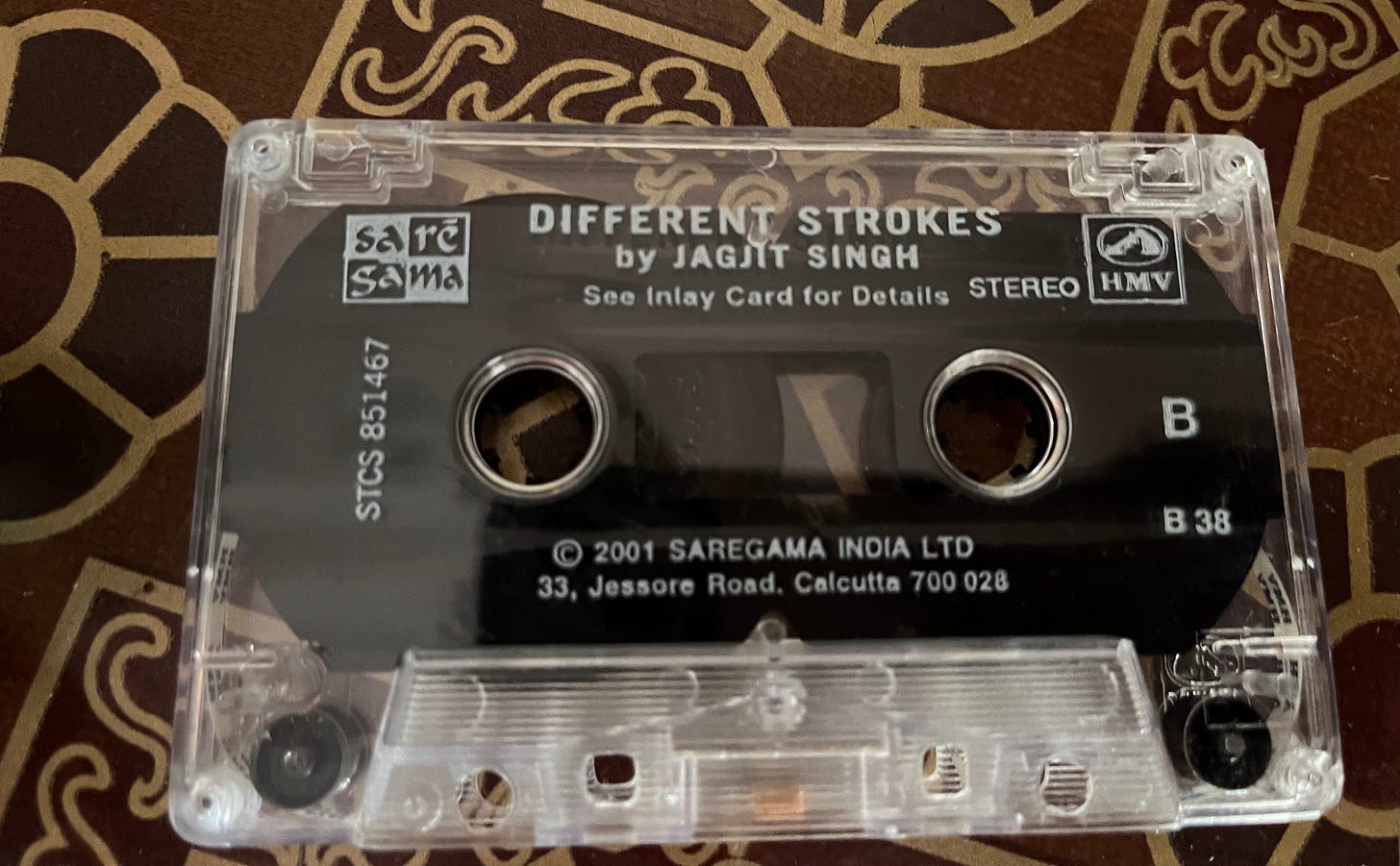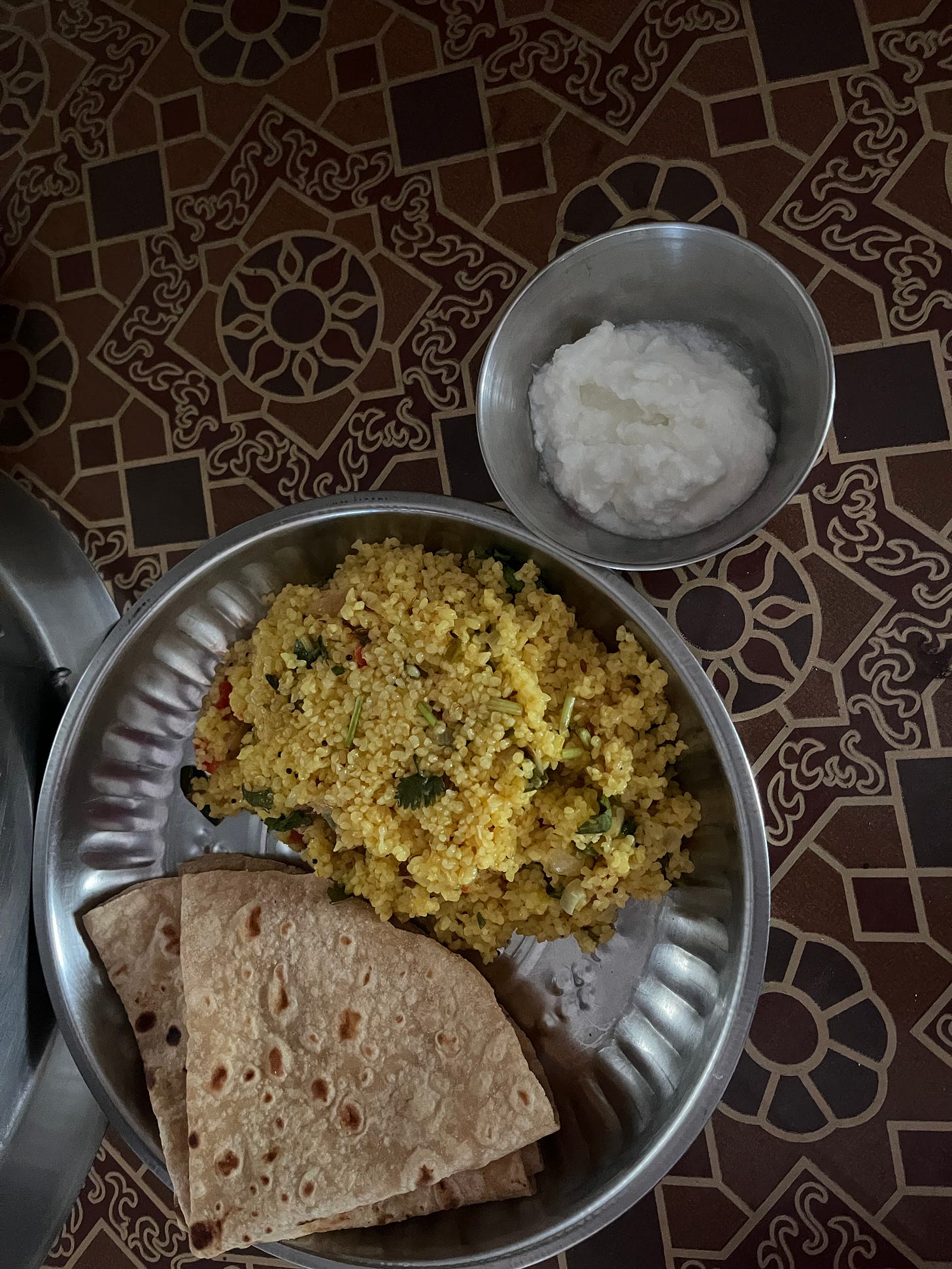Racing through the memory lanes
Weekly Epiphanies: a whirlwind tour to my city, a human hypothesis of 'thigmomorphogenesis'
Hello Dear Readers,
I skipped posting last weekend as I was travelling. Mumbai felt the same as my last whirlwind visit two years ago, except this was the second week of June when monsoon clouds played hide and seek with the sun. It used to be my favourite time of the year as a child. But the Mumbai of my childhood is gone, and I saw a city that, though friendly, will prove to be a harsh environment for my parents to lead an independent and healthy retired life.
The trip goal was to help my parents clean out stuff from their apartment so that they could rent it out. We had just a week to sort out nearly five decades of collected memories, many of which we committed to our hearts and minds for one last time and threw away, like the old Sony Walkman, which will need some time, effort, and an old pair of earphones to test if it’s still working. We had the audio cassettes to accompany it, but we didn’t have time to even try if it could work.
I gave away my childhood violin, too, with the hope that some enthusiastic parent would take it to the right craftsman and repair it for their musically inclined child. The memories of the violin sessions will live on through my love for music and a promise to take it up at a later time in life.
The school report cards were symbolically disposed of. Three decades later, I don’t want to be hanging on to the feeble thread of past glory. It did serve to wow my daughter as she read through all the comments from my teachers, the near-perfect scores, and the top rank in every grade. She said it was a “humbling” experience, but to me, it served a greater purpose. By tearing away my old report cards, I let her know that she is entering a new phase in her life as an undergraduate, and what she has accomplished so far in school will serve her well from here on but will not be as important ten years later.
However, I couldn’t bring myself to throw away the certificates. They don’t make them like that any more. My kid receives planet-friendly and pocket-friendly e-certificates. My certificates were physically printed on thick cardboard paper, and the name and the reason for the win were hand-written by my favourite teachers. I want to preserve the memories of their hard work and efforts to appreciate us.
Overall, it was an emotional trip for both my parents and me, but we didn’t have time to brood over it. Perhaps, someday, we will sit back and think about what we culled from our life in those seven days in Mumbai.
I discovered the convenience of fifteen-minute food and grocery deliveries when our pantry was empty by choice and we were forced to eat outside.
Mumbai neighbours are the best ones you could have. Our neighbour offered fresh breakfast every day, especially for my daughter. And, if not for our protests, they would have made us lunch and dinner, too.
Touching down at Singapore Changi Airport, we were reminded of how we have probably turned out to be spoilt brats. Spoilt by the efficiency, the hygiene, the smooth processes, and the general convenience of being in a country like Singapore, of course, without fifteen-minute deliveries.
Mumbai reminded me of one more thing, though. In a densely populated city or country, one encounters a diverse range of people in a short period. In Singapore, I rarely come across bibliophobes or even non-readers, but whenever I visit India, I do.
Reading and books have long been associated with the privileged, although I have also come across stories of people who could barely afford two square meals a day but would happily part with their hard-earned money for their favourite books.
Our world is comprised of multitudes, and individuals are complex. When I met a neighbour who said she was afraid of books, I imagined a childhood deprived of good books, suitable mentoring, and probably a nurturing environment. Unless children have been constantly exposed to threats to their survival, values, and morals and have had to fight their way into a privileged world, I do not see how they could remain unaffected by the world of stories and fiction. When, in real life, you do not have someone to buy a beautiful book for you or even nudge you gently towards a bookshelf, it is natural that the person may grow up with an aversion to the exclusive world of books and readers. Bibliophiles and readers, too, don’t make it easy by propping themselves up on a pedestal.
Survival for the mind and the soul depends on the arts, but what if your stomach is hungry?
However, a childhood deprived of reading and books need not mean that you never pick them up again in your life. I wish I could have recommended a few that the said neighbour could start with, but in the heat of the moment, I clammed up. More so because she asked about my job or work outside of writing, a tricky question for an unemployed self-published author.
Now that I think of it, I let my insecurities get the better of my curiosity. It would have been a good opportunity to figure out why someone might be averse to books, a psychological investigation that could have helped me with character development in future books.
Reading Life
That brings me to something I learnt from one of the books that I have been reading - The Heartbeat of Trees by Peter Wohlleben.
I came across the term Thigmomorphogenesis, a phenomenon by which plants and trees alter their growth patterns in response to mechanical stimuli, such as touch, wind, and rain. The author discusses the theory of nurturing plants through touch. Many plant lovers and gardeners claim that touching a plant stimulates growth, likening it to the nurturing touch of a mother that comforts a baby. On the contrary, the author says, the plants merely respond to what they perceive as a threat to their existence. When humans touch them, they perceive it as a predator species threatening their survival and grow thicker stems. So, it’s not about love, but about fear!
My hypothesis is that people who grew up in environments that felt constantly threatening developed a thick skin and, as a result, found it difficult to understand the contrasting point of view on life that books offer. They have accepted their truth and built an emotional defence system around their understanding of life and its threats. To accept or understand a different perspective, they will need to shed their preconceptions somewhat, let down their guard, and be more open.
Does that mean that every reader is empathetic or broad-minded? I doubt it. But letting a writer into your mind, into your soul, is a good start. Writers won’t troll you for not accepting their book, they won’t shout at you from the pages of their book, nor would they banish you for disagreeing. But they’ll give you time until you read the last word, the last sentence, the last paragraph, to form your opinion, and even until after you have read the whole book multiple times.
As a reader, you are allowed to process your thoughts in solitude or, if you so wish, with other readers. Books do not judge the readers by their actions or words. Books do not judge anyone at all unless there is a truly unidimensional villain in the story.
I doubt that any book haters would be reading my post, but if you are, please give books a chance. Your best bet is a library where you can browse, read, and abandon at your will. No one will judge you for doing so!
Writing Life
My book, The Lakeview Mystery, is now available on Amazon US and UK websites. Yippee!! It’ll take a week or two to get the ebooks listed, I suppose. Watch this space for the ebook listing announcement, or follow me on X and Instagram, where I update more frequently.
Until next week, stay happy, and keep reading.
Sudeepa
P.S. Forgive me if I have rambled in this post. It’s a combination of emotional processing and flu.







Hope you're better n flu has gone. I think you will like The People in the Trees by Hanya Yanagihara. I couldn't complete it and paused it but I will go back for sure. It's a heavy book. There are so many things in this post that I loved. Your neighbours are one. Happy moving and living to wherever your parents are going.